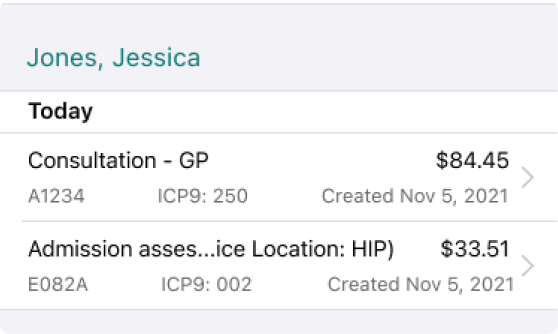Ontario Schedule of Benefits
Search the Ontario Schedule of Medical Benefits electronically. We’ve digitized all the OHIP billing codes so you can easily find the most up to date billing rules and amounts. If you’re looking for more information on OHIP billing including how the system works, how to get paid, and how to bill properly, see our OHIP Billing Guide .
OHIP Billing Codes
-
- Anaesthesia (01)
- Cardiac Surgery (09)
- Cardiology (60)
- Clinical Immunology (62)
- Community Medicine (05)
- Critical Care Medicine (11)
- Dermatology (02)
- Diagnostic Radiology (33)
- Emergency Medicine
- Endocrinology & Metabolism (15)
- Family Practice & Practice In General (00)
- Family Practice And Practice In General (00)
- Family Practive And Practive In General
- Gastroenterology (41)
- General Surgery (03)
- General Thoracic Surgery (64)
- Genetics (22)
- Geriatrics (07)
- Hematology (61)
- Infection Disease (46)
- Infectious Disease (46)
- Internal And Occupational Medicine (13)
- Internal And Ocucpational Medicine (13)
- Laboratory Medicine (28)
- Medical Oncology (44)
- Nephrology (16)
- Neurology (18)
- Neurosurgery (04)
- Nuclear Medicine (63)
- Obstetrics And Gynaecology (20)
- Ophthalmology (23)
- Opthalmology (23)
- Orthopaedic Surgery (06)
- Orthorpaedic Surgery (06)
- Otolaryngology (24)
- Paediatrics (26)
- Physical Medicine & Rehabilitation (31)
- Plastic Surgery (08)
- Psychiatry (19)
- Radiation Oncology (34)
- Respiratory Disease (47)
- Rheumatology (48)
- Urology (35)
- Vascular Surgery (17)
-
- Bone Mineral Density (BMD) Measurement
- Chest And Abdomen
- Computed Tomography (CT)
- Fluoroscopy - By Physician With Or Without Spot Films
- Gastrointestinal Tract
- Genitourinary Tract
- Head And Neck
- Lower Extremities
- Miscellaneous Examinations
- Obstetrics And Gynaecology
- Skeletal Surveys
- Special Examinations
- Spine And Pelvis
- Upper Extremities
-
- Allergy
- Anaesthesia
- Cardiovascular
- Critical Care
- Dermatology
- Dialysis
- Echocardiography
- Electrocardiography (ECG)
- Endocrinology And Metabolism
- Gastroenterology
- Gynaecology
- Haematology
- Home And Self Care Services
- Injections And Infusions
- Injections Or Infusions
- Laboratory Medicine
- Nephrology
- Nerve Blocks - Interventional Pain Injections
- Nerve Blocks - Peripheral / Other Injections
- Nerve Blocks For Acute Pain Management
- Neurology
- Neurosurgery
- Non-Invasive Cardiography
- Ophthalmology
- Otolaryngology
- Palliative Care
- Physical Medicine
- Psychiatry And Respiratory Disease
- Sleep Studies
- Urology
-
- Anaesthesiologists' Services
- Assessments
- Emergency Department By Emergency Department Physician
- Emergency Department Sessional Fees
- General Information
- Hospital And Institutional Consultations And Assessments
- Other Premiums
- Special Visit Premiums
- Special Visit Premiums - Long-Term Care Institution
- Supportive Care/Monitoring By Surgical Assistant Of Anaesthesiologist
- Surgical Assistants' Services
- Temporary COVID-19 Service
-
- Anterior Spinal Arthrodesis Following Decompression
- Anterior Spinal Arthrodesis With Instrumentation Without Decompression
- Anterior Spinal Decompression
- Deformities Of The Spine
- Fractures Of The Spine
- Meningocoele And Myelomeningocoele
- Posterior Spinal Arthrodesis As Sole Procedure
- Posterior Spinal Arthrodesis Following Decompression Or Osteotomy
- Posterior Spinal Decompression
- Procedures Involving Neural Elements
- Procedures On Musculoskeletal Elements
- Revision Procedures For Spinal Surgery
- Tumours / Infections Of The Spine
Search all OHIP billing codes
Lookup any OHIP billing code using our searchable database. Search by billing code or keyword.
Get a $150 Billing Credit
When you Sign Up for our Comprehensive Plan.1
No credit card required. Cancel anytime.1


